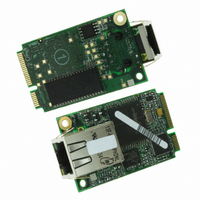20-101-1307 Rabbit Semiconductor, 20-101-1307 Datasheet - Page 17

20-101-1307
Manufacturer Part Number
20-101-1307
Description
CORE MODULE RCM5760
Manufacturer
Rabbit Semiconductor
Type
Serial to Ethernetr
Datasheet
1.20-101-1306.pdf
(119 pages)
Specifications of 20-101-1307
Module/board Type
MPU Core Module
Number Of I/os
32
Ethernet Connection Type
10/100 Base-T with RJ-45
Memory Type
Flash
Interface Type
Ethernet
Operating Voltage
3.3 V
Operating Current
200 mA
Operating Temperature Range
- 40 C to + 85 C
Board Size
30 mm x 51 mm x 3 mm
Product
Modules
For Use With/related Products
RCM5760
Lead Free Status / RoHS Status
Lead free / RoHS Compliant
Other names
316-1182
2.3 Starting Dynamic C
If you already have Dynamic C installed, you are now ready to test your programming connec-
tions by running a sample program. Start Dynamic C by double-clicking on the Dynamic C icon
on your desktop or in your
the Dynamic C
verify that
You may have to select the COM port assigned to the USB cable on your PC. In Dynamic C, select
Options > Project Options
OK
2.4 Run a Sample Program
Find the file
with the
Run
around in a box.
This program shows that the CPU is working.
2.4.1 Troubleshooting
If you receive the message
to the USB cable was identified and set up in Dynamic C as described above. This same error
occurs when Windows has already allocated the COM port to another process.
If you receive the message
nected to the wrong COM port, or the connection may be faulty. First, check both ends of the USB
cable to ensure that it is firmly plugged into the PC and the USB connector in the Interface Board.
Ensure that the module is firmly and correctly installed in its connector on the Interface Board.
If Dynamic C appears to compile the BIOS successfully, but you then receive a communication
error message when you compile and load a sample program, it is possible that your PC cannot
handle the higher program-loading baud rate. Try changing the maximum download rate to a
slower baud rate as follows.
• Locate the
If a program compiles and loads, but then loses target communication before you can begin
debugging, it is possible that your PC cannot handle the default debugging baud rate. Try lower-
ing the debugging baud rate as follows.
• Locate the
Press
successfully
MiniCore RCM5700/RCM6700 User’s Manual
Project Options
Project Options
.
menu. The
<Ctrl-Y>
File
Use USB to Serial Converter
PONG.C
menu, compile it using the
Serial Options
Serial Options
to force Dynamic C to recompile the BIOS. You should receive a
Options > Project Options
STDIO
message once this step is completed successfully.
menu. Select a slower Max download baud rate. Click
menu. Choose a lower debug baud rate. Click
, which is in the Dynamic C
window will open on your PC and will display a small square bouncing
Start
Could Not Open Serial Port
No Rabbit Processor Detected
, then select this COM port on the “Communications” tab, then click
dialog on the “Communications” tab in the Dynamic C
dialog on the “Communications” tab in the Dynamic C
menu. Select
Compile
rabbit.com
is selected to support the USB cable. Click
menu. Then click on the “Communications” tab and
Store Program in Flash
menu, and then run it by selecting
SAMPLES
folder. To run the program, open it
, check that the COM port assigned
, the USB cable may be con-
OK
to save.
on the “Compiler” tab in
OK
Bios compiled
to save.
Run
Options >
Options >
OK
in the
.
17

















